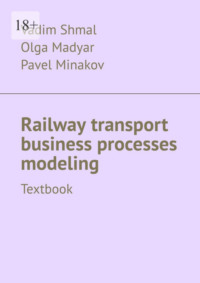
Railway transport business processes modeling. Textbook
Stage 1. Understanding customer orientation.
Stage 2. Education of customer orientation.
Stage 3. Customer orientation training.
Stage 4. Reward of customer orientation.
For the successful implementation of the principles of customer orientation, 5 key components are identified, which are fundamental for obtaining a productive result (Figure 2.2) [5].
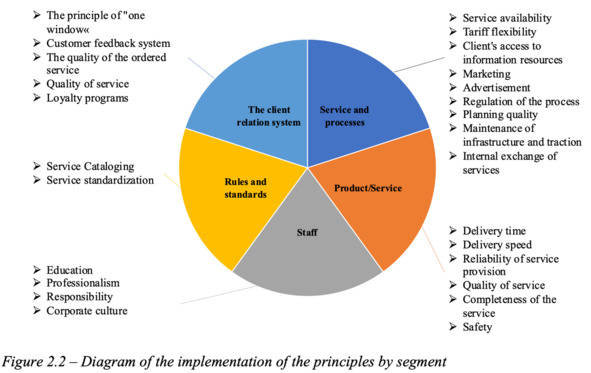
For fruitful and methodical work aimed at the development of customer orientation, it is necessary to determine due attention to the study of the principles of customer orientation and the basics of organizing work with internal and external clients of the Russian Railways holding.
2.4 Internal and external customer orientation of the Russian Railways Holding. Customer orientation principles
The concept of «client» is interpreted not only in relation to the consumer of the service or the buyer, but can also be used to identify the interests and internal customers. The achievement of strategic goals by the company is impossible without meeting the requirements for the entire transportation process and its participants. Therefore, the concept of customer orientation is considered to be complex, which includes an external and internal component (Figure 2.3).
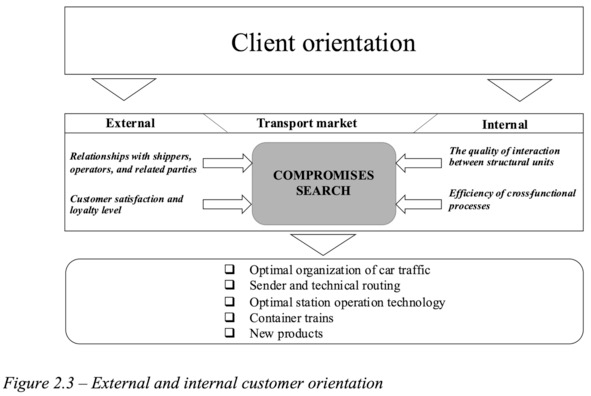
External customer orientation is responsible for the strength and long-term relationship with customers, as well as their level of satisfaction and loyalty.
Internal customer orientation is characterized by the quality of interaction between the structural divisions of JSC «Russian Railways», considers the effectiveness of the organization of end-to-end cross-functional processes in the process of value creation from the moment of their planning until the completion of the provision of services to an external client.
In accordance with the order of JSC «Russian Railways» dated July 26, 2016 No. 1489r, the development of the Holding’s external customer orientation provides [6]:
– building a system of segmentation and differentiation of customers in each type of activity, identification and implementation of needs for each segment and client;
– offering customers modern services in all types of business;
– ensuring accessibility and simplification of procedures for concluding contracts for the provision of services;
– development of inter- and multi-modal transportation;
– expansion of the portfolio of end-to-end complex services based on the development of logistics technologies: door-to-door delivery, just-in-time, last mile, etc.;
– development and implementation of loyalty programs in all types of activities;
– building customer feedback mechanisms;
– development and application of tools for assessing the level of customer satisfaction and loyalty;
– development and implementation of an Integrated information management system in the field of customer relations (CRM systems);
– unification of requirements for quality and consumer characteristics of services, implementation of service quality standards;
– development of the institute of customer service managers and unified customer service centers at the landfills of the railway network;
– development of marketing functions and active promotion of services in regional and linear divisions of the Corporate Transport Service Center – a branch of JSC «Russian Railways»;
– improvement of the regulatory environment and legal framework in the field of freight transportation;
– increasing the level of corporate culture in terms of the development of customer orientation and the focus of business units on a single result;
– providing quality services in all types of business.
The development of internal customer orientation provides:
– implementation of development concepts and functional strategies by type of activity;
– coordination of interaction between structural divisions, branches of JSC «Russian Railways» and business units of the holding «Russian Railways», aimed at forming an optimal portfolio of services based on the requirements of the transport market and the accepted parameters of strategic development;
– development of cross-functional end-to-end processes aimed at creating additional value for customers;
– improvement of the internal turnover of services based on the application of the system of work orders and quality parameters;
– improvement and expansion of the use of technological audit tools for the creation and implementation of services and services;
– fulfillment of the Company’s obligations under the Collective Agreement of JSC «Russian Railways»;
– ensuring social stability in labor collectives;
– implementation of internal corporate training and staff development programs;
– implementation of projects «Construction of technological housing» to secure highly qualified personnel.
The principles of customer orientation are crucial for a large holding of JSC «Russian Railways». The fulfillment of the conditions of the principles will allow the company to attract an additional flow of customers and profit, thanks to the understanding, quality approach and satisfaction of the needs of each of them.
The key principles of JSC «Russian Railways» are:
1) the company should have only one idea about customer orientation;
2) the rules of interaction with the client should be clearly regulated;
3) how customer-oriented the company is should be decided by the customer himself;
4) customers should be differentiated;
5) the company’s orientation should be aimed at key customers;
6) customer orientation should have the effect of increasing the profitability of the company;
7) there will be no customer orientation without profit from investing in the service;
8) the concept of «customer» should not be limited to the concept of consumers of goods and services;
9) the company is obliged to take into account the interests of internal customers.
2.5 Unified Customer Orientation Policy of the Russian Railways Holding
The unified policy of customer orientation of the Russian Railways Holding was developed in accordance with the instructions of the final meeting of the Management Board of JSC Russian Railways for 2015 and approved by the Order of JSC Russian Railways No. 1489r dated July 26, 2016. The main guidelines for the development of this policy were the implementation of strategies for the development of the railway industry and the Russian Railways holding, as well as long-term development programs of the holding, creating a basis for meeting the needs and expectations of internal and external customers.
The policy complies with the current legislative norms and takes into account the provisions of internal, regulatory legal acts of the Russian Railways Holding.
It defines the basic principles of the formation and functioning of the corporate customer orientation system in the Russian Railways holding, including structural divisions, branches of JSC Russian Railways, subsidiaries and affiliates of the Russian Railways holding at all levels of management (Figure 2.4), will fix the unity of norms, principles, methods and approaches in the holding, including all structural divisions, subsidiaries and dependent companies at all levels of management.
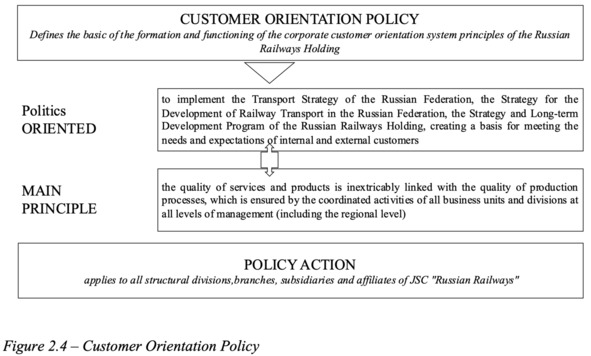
The policy takes into account world experience, which indicates that a full-scale transition to the principles of customer orientation is one of the main competitive advantages that ensure in the medium and long term the growth of revenue from existing and new customers.
This Policy contains the basic values, criteria and rules shared by managers and employees and serves as the basis for the activities of all structural divisions, branches of JSC «Russian Railways», subsidiaries and affiliates of the holding «Russian Railways» in the field of freight transportation, including regional and linear levels of management.
The customer orientation policy is aimed at implementing a clear understanding that the quality of services and products directly depends on the quality of production processes, which can be achieved through coordinated activities of all divisions, business units and business units of the holding.
The concept of the organization of a Single Policy defines the organizational structure of the management of the implementation of a Single Policy, tools and methods of implementation, as well as methods for evaluating performance and performance indicators (Figure 2.5).
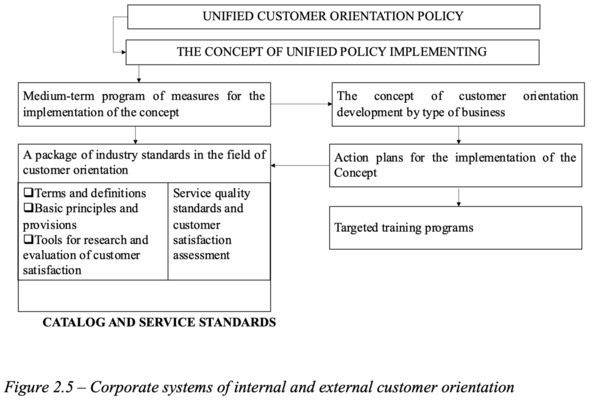
The purpose of creating a Unified customer-oriented policy was the creation and implementation of corporate principles for managing the processes of forming a complex of new services provided and supporting old ones, as well as improving the quality of relationships with customers of JSC «Russian Railways», aimed at solving the following tasks:
– increasing profitability, competitiveness and efficiency of activities;
– increasing the volume of sales of services and entering new market segments;
– elimination of losses in the holding’s production chain;
– optimization of business processes;
– improving the quality of services provided and, as a result, reducing the overall losses of the company;
– expansion of the offered goods and services;
– increasing the period of interaction of the Holding with the client;
– formation of a knowledge base based on the study, accumulation and systematization of the experience of large Russian and foreign holdings;
– training and completion of professional development courses by personnel, comprehensive development of human resources, etc.
3 INNOVATIVE PROPOSALS FOR THE CUSTOMER ORIENTATION DEVELOPMENT OF THE RUSSIAN RAILWAYS HOLDING
3.1 Organization of transport and logistics service packages based on segmentation of clients of JSC «Russian Railways»
The basic principles of customer orientation are aimed at solving the main task – optimizing customer relations. Attracting and maintaining the customer base of JSC «Russian Railways» is possible if the conditions of customer orientation and all the obligations of the company are met.
One of the proposals for the development of customer orientation of the holding may be the organization of a comprehensive service based on segmentation of customers and manufacturers, as well as the formation of service packages.
To achieve this goal, it is necessary to use marketing principles, the complex of which includes:
– comprehensive study of the market, desires and needs of customers;
– determination of the capacity of the transport market;
– processing of the collected information, identification of consumer preferences, segmentation of the market by blocks;
– development of «individual» services based on the results of the analysis of information about the needs and needs of customers;
– justification of the feasibility of introducing new services;
– control of results and promotion of basic and additional services on the market.
When determining a market segment, it is necessary to develop research methods that may depend on the purpose, object of research, the degree of coverage of the transport market, etc.
A market segment is a part of the market allocated in a certain way, which must have one or more common features. [3] In turn, the feature will be a way to highlight a market segment. Each customer is a potentially defined market with their own preferences, desires and needs. It is quite difficult for such a large holding company as JSC «Russian Railways» to determine the range of services individually for each client, therefore, the company needs to provide high—quality service to homogeneous segments – groups of transport services customers that differ in the nature of demand and purchasing power. Today there is no single way to divide the transport market into segments, but the most significant factors for splitting can be: geographical, demographic, psychographic and behavioral.
Dividing customers into segments will allow the company to study the structure and needs of the transport market, the proposals of competitive companies, establish a rational price component, prepare and modernize vehicles, provide high-quality training of personnel to master the selected segments of the holding’s customers.
In addition to customer segmentation, segmentation for transport services can also be done in the same way. It is possible to segment services in the format of transport and logistics packages.
In the process of introducing such packages to the transport market, the income and profitability of the company increases, due to the optimization of customer awareness, the range of services, the quality of support services, an effective system of interaction with the customer in the 3PL/4PL service format and the formation of an appropriate pricing policy.
3.2 Introduction of digital technologies into the transport and logistics activities of JSC «Russian Railways» as a method of improving the customer service quality
To improve the main indicators of the holding, laid down in the Long-term development program until 2025, new commercial solutions and improvement of the existing technology of the companies will be required.
In addition to these actions, an important factor is the constantly changing customer requests.
The main goal of the company is to become a company that not only receives income from the inertial growth of traffic volumes, but also occupies a stable position in the market as a transport and logistics company. This task can be solved by developing mutually beneficial partnerships with customers and service providers, constantly changing, creating new products and services in the interests of consumers.
To date, a significant part of the initiatives are already being implemented, forming a model in the future, the center of which is the Company’s customers. The basic principles of its construction are presented in Figure 3.1 [7].
Most of the principles lie in the field of business solutions, but an important role will be played by the support of ongoing initiatives with digital solutions and services built on the basis of advanced technologies.
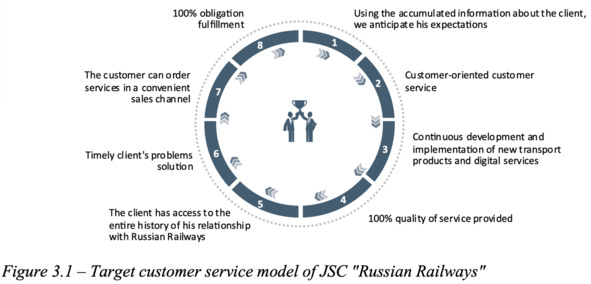
Currently, the Company has created an extensive IT infrastructure of the railway transportation market based on the AS ETRAN, which over the period of its existence has transformed from a departmental system of JSC «Russian Railways» into a state-scale system and has essentially become a global information space for all participants in the railway transportation market (Figure 3.2) [7].
However, it is necessary to modernize the commercial infrastructure of the market, which includes a complex of production and digital technologies that reflect the railway’s ability to provide revenue from providing services to the transport market. This can be achieved by digitally transforming the business model of the market (Figure 3.3) [7].
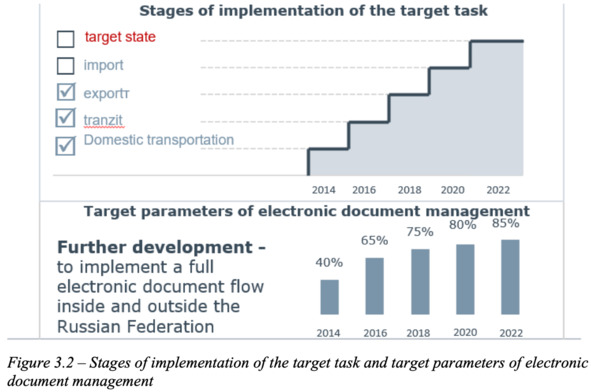
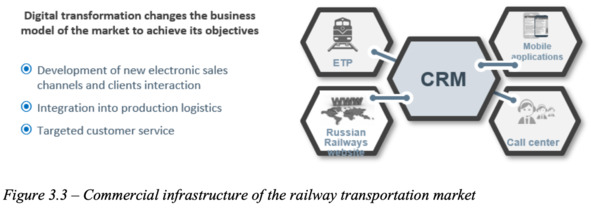
Nevertheless, the development potential of the ETRAN system has not been exhausted and will be directed to the field of intersystem interaction with Federal executive authorities and other participants in the transport market, the development of electronic document management both in domestic transportation and in international transportation.
With a promising growth in demand for transport services, it is planned, especially in the segments of small and medium-sized businesses, to sell them online. The use of WEB technologies is considered as the most democratic, promising, mobile and rapidly developing network environment for the implementation of the Company’s services.
As an example, a new service is presented – the client’s personal account on the website of JSC «Russian Railways», where in addition to calculating the cost of transportation and additional services, the client can find the nearest «points of sale» of the company’s services on the map in real time, get information about the location and technical condition of wagons, provide documents in electronic form and contact the unified information reference center.
In the future, it is planned to expand the functionality of the personal account: obtaining an assessment of customer satisfaction with the quality of services provided, providing personalized offers, news, promotions and other information, including notifications for car owners about the arrival of the car, movement, refusal of the recipient from the car, displaying contracts concluded by the client, agreements and services included in them, the possibility of concluding a contract in electronic form according to the principle of the offer, displaying the status of a single personal account of customers, the possibility of filing a claim by the client for consideration by JSC «Russian Railways», recording the client for certification of cargo fastening, ordering the company’s services, etc.
Digital innovations are gaining popularity in the Call Center of JSC «Russian Railways» in freight transportation. One of which was the artificial intelligence «Alice for Business». The main goal of the project is to automate the customer service process of the Holding as much as possible using artificial intelligence technologies. Today, Alice is being trained for self-service by artificial intelligence of calls on topics of a reference nature, outgoing call service with various service scenarios by voice portal, work in the chat channel-the possibility of contacting the robot through a form on the website and integration with messengers. In the future, it is planned to implement various service scenarios with a voice portal, depending on the emotional state of the client, the deployment of a subsystem of biometric identification of the client.
One of the most ambitious projects is the development of a service for monitoring smart contracts for freight transportation based on a blockchain in the transport and logistics activities of JSC «Russian Railways». The aim of the project is to create a unified information space between the participants of transportation and to ensure monitoring of the implementation of smart contracts for freight rail transportation based on a distributed data registry platform. The main advantages of this project will be: the speed of improvement of logistics operations, transparency of processes, improvement of corporate technological discipline, reduction of act and claim work, cost optimization, quality control throughout the route.
3.3 Development of customer-oriented electronic service
One of the main directions of improving the processes of organizing electronic document management.
JSC «Russian Railways» has converted into electronic format a number of documents that are necessary for transportation at all stages from the moment of planning to the issuance of cargo and preparation of financial documents.
To date, work is underway to expand the use of electronic document management, which is used at almost 4,000 stations in the form of work with electronic documentation (ED) due to the presence of an electronic signature (ES) among employees.
Almost 100 thousand external users have electronic keys for signing transportation documents.
As part of the organization of electronic document management to reduce the delivery time of financial documents to the client, JSC «Russian Railways» has introduced electronic document management of accounting documents using an electronic signature. To date, in addition to invoices, acts of services rendered and lists to them, the client receives in electronic form with an electronic signature: the act of reconciliation of settlements, invoices for payment of penalties.
Electronic document management is widely used in international transportation. International transportation has already been implemented on electronic legally significant waybills with Finland, Ukraine, Latvia, Lithuania, Estonia, Belarus, Kazakhstan. In the near future, the list of such countries will be replenished, which will significantly reduce the transportation time and improve the communication component with cargo owners.
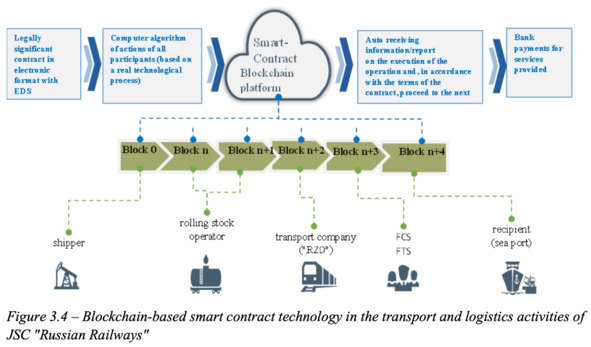
Since 2017, a new type of public electronic service has been introduced for cargo owners and rolling stock operators, aimed at creating and developing a comfortable communication environment for all categories of customers based on modern hardware and software products – the electronic trading platform «Cargo Transportation» (ETP CT). ETP CT is a specialized information system that allows using Internet technologies to provide a comprehensive cargo transportation service with the provision of operator wagons. The main advantages of this system are:
– low percentage of Agent’s commission;
– non-discriminatory access to Russian Railways services;
– freedom to join the service.
Currently, the software content of the ETP CT, technologically integrated into the complex of interconnected information and control systems of the Russian Railways holding, makes it possible to optimally solve the maximum number of tasks related to transportation, focusing on the priority – meeting the needs of service users and promptly responding to the challenges of the transport market.
Конец ознакомительного фрагмента.
Текст предоставлен ООО «ЛитРес».
Прочитайте эту книгу целиком, купив полную легальную версию на ЛитРес.
Безопасно оплатить книгу можно банковской картой Visa, MasterCard, Maestro, со счета мобильного телефона, с платежного терминала, в салоне МТС или Связной, через PayPal, WebMoney, Яндекс.Деньги, QIWI Кошелек, бонусными картами или другим удобным Вам способом.
Вы ознакомились с фрагментом книги.
Для бесплатного чтения открыта только часть текста.
Приобретайте полный текст книги у нашего партнера:
Полная версия книги
